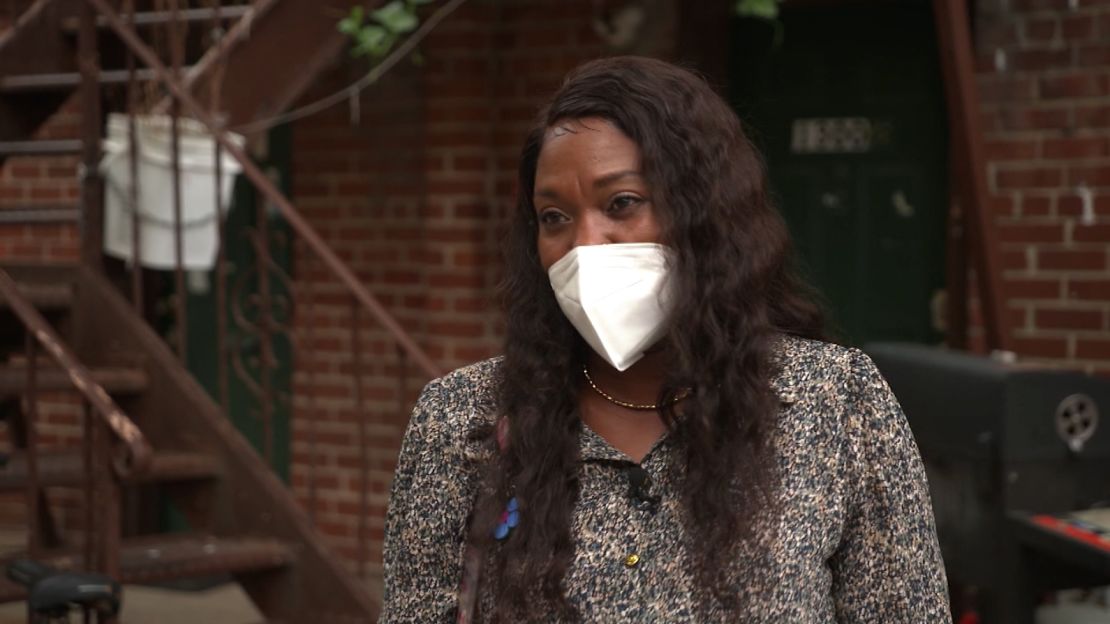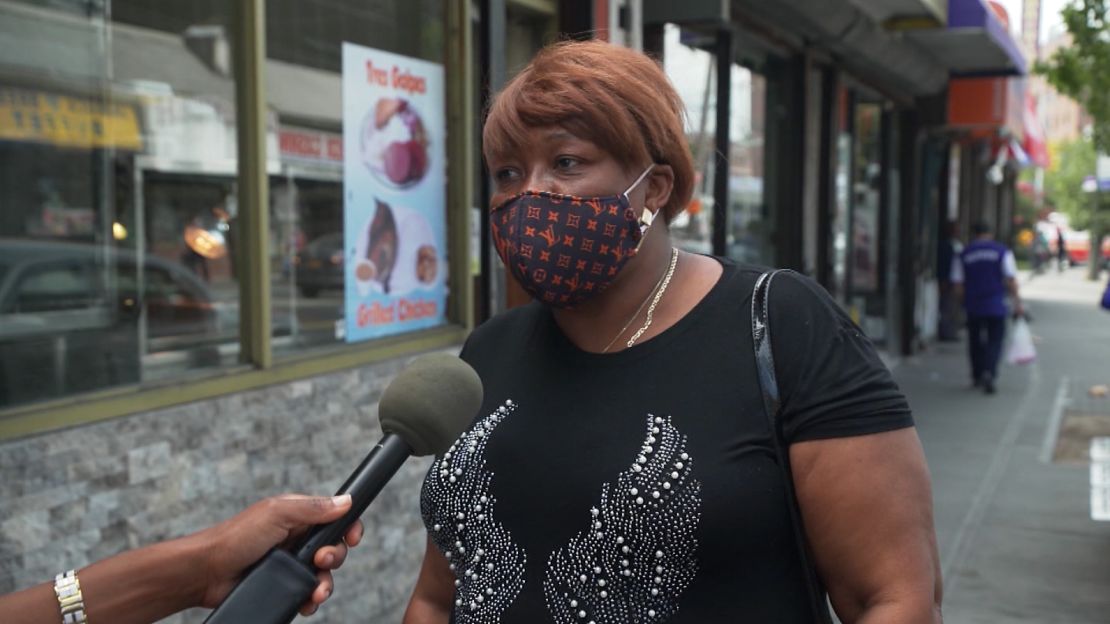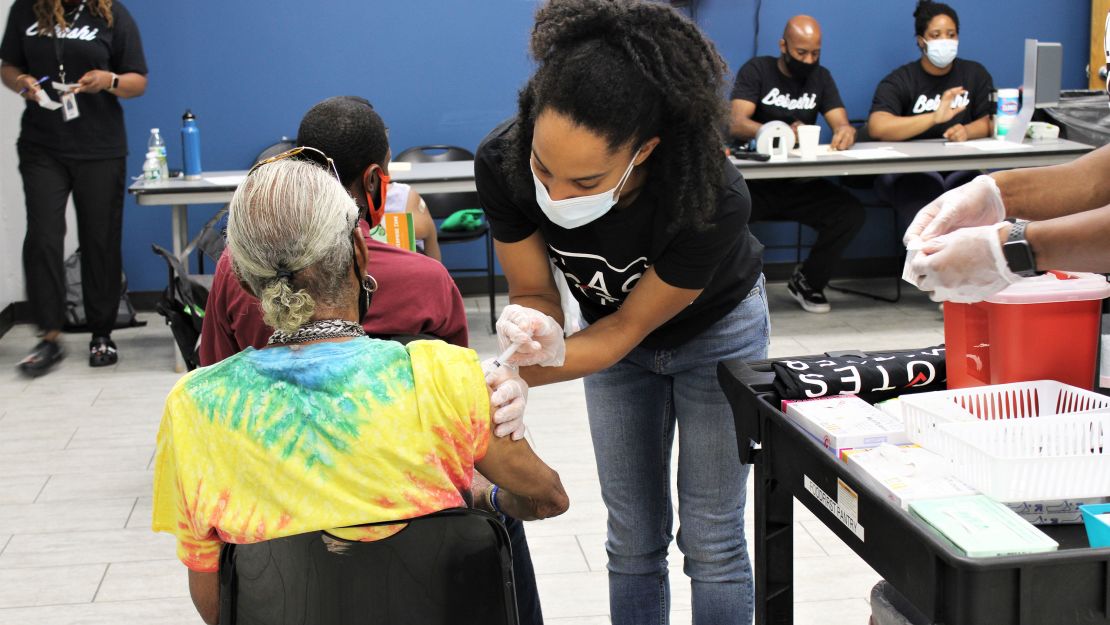Months after the rollout of the Covid-19 vaccine, Miriam Vega is still in a battle to persuade some people to get the shot.
“It’s extremely challenging fighting the misinformation we’re fighting. You know, Facebook, we’re fighting Twitter,” the CEO of the Joseph P. Addabbo Family Health Center in New York City told CNN about claims made on social media. “But we’re also fighting people’s misperceptions and distrust of the system as a whole.”
The stakes are high in the neighborhood where the center is located.
Far Rockaway, Queens, is one of the areas in New York hardest hit by the pandemic. One out of every seven people in Far Rockaway has been diagnosed with the virus and just 35% of people here are fully vaccinated, health officials say. The neighborhood has the lowest vaccination rate in the city. Nearly half the population in this ZIP code is Black and about a quarter is Hispanic.
Citywide, just 28% of Black New Yorkers between the ages of 18 and 44 are fully vaccinated. The Hispanic community is the second-least fully vaccinated population in that age group, with 49% being fully vaccinated, according to NYC Health.
Yury Mota-Rodriguez and Tina Burke are vaccine advocates on a mission in the Southeast Queens neighborhood.

“We want to talk about the vaccine. Have you been vaccinated,” Mota-Rodriguez asks a young woman on the street.
Her response: “No. Not yet.”
But there’s no judgment. It’s about listening – being seen – and making the case for a lifesaving vaccine.
“We ain’t preaching. We just teaching,” Burke tells an older man while making her rounds.
“We’re a part of the community and we want to understand what their concerns are,” Burke tells CNN.
Burke is a care coordinator and works with Mota-Rodriguez at the Joseph P. Addabbo Family Health Center.
Community-based centers like Addabbo are critical and their efforts have gotten thousands of people vaccinated, Vega says.
A wider state effort
Concerned with the low vaccination rates, New York state is increasingly turning to grassroots groups to address the problem amid the Delta variant surge.
The state has committed to a $15 million investment in six community-based organizations that aid Black, Latinx and Asian and Pacific Islander communities.
Last month, outgoing Gov. Andrew Cuomo announced the renewed investment into six community-based organizations in New York state.
“We need a different approach. And the approach has to be community-based organizations who can have conversations in the community,” he said.
The six organizations are the Hispanic Federation; the Federation of Protestant Welfare Agencies; the New York Immigration Coalition; the Asian American Federation; the Charles B. Wang Community Health Center; and Apicha Community Health Center.
“We created a digital toolkit providing the most critical information concerning the virus, how the vaccine was developed, how it works, its efficacy, and how to access it,” said Jennifer Jones Austin, CEO of the Federation of Protestant Welfare Agencies.
Multiple reasons for vaccine hesitancy
Although vaccine hesitancy has been attributed to distrust, health advocates and groups say sometimes there are other reasons.
“Major concerns Latinos have about getting vaccinated are not actually related to the vaccine itself, but access issues,” said a spokesperson for the Hispanic Federation. “For example, common reasons Latinos cite for not getting the vaccine include fear of missing work or, for undocumented immigrants, fear of needing to show an ID,” the spokesperson said.
Despite these fears, the New York Department of Health states that only proof of age is required to receive the vaccine and you will not need to provide proof of immigration status or a Social Security number to get vaccinated.
Back in Far Rockaway, the reasons for not getting the vaccine vary.
Viola Lewis is a home health aide and is worried about getting sick from the shot – and missing work.
“I don’t want to take the vaccine and go back to work immediately because if I take sick there, my client, I have no way to get paid, she says.
The Rev. Clifton Mullings says he’ll let his church be used as a vaccination site, but he’s not getting a shot himself.
“Personally, I’m doing good without the vaccine. I believe the emphasis should be on people boosting their immune system.”
But there are many lives that need to be saved. Vega, of the Addabbo center, refuses to give up.
“One-time messaging is not enough, we have to go back. And I myself, have three success stories personally, lately, and I spoke to these people, maybe a minimum of 10 times each,” she says.
Vega says that in underserved communities people don’t often have access to a lot of media, or internet. Word of mouth is extremely important getting information out. It can hurt by getting misinformation, she says. But it can also help by getting good information out and role models.
“So if one person gets vaccinated, and they tell their neighbor, ‘Hey, I got vaccinated, all I got was a sore arm. It’s OK.’ Then they pass that along, and it snowballs and that becomes contagious. So good information can also become contagious and help the community rise above this misinformation,” she says.
Austin said lower vaccination rates are also connected to “living with the trauma that this nation has caused to the Black community and the lack of critical health care.”
And in other cases, people who heard it would take 14-16 months to make the vaccine became concerned when it came out in a shorter time frame.
Some people with chronic illnesses wonder whether the vaccine will make their conditions worse. And for some of those who’ve had the virus, they think they have a good handle on how to avoid it, Austin said.
Shaun Mohammed in Far Rockaway says he hasn’t gotten the shot because he doesn’t know how it would impact his Crohn’s disease.
“That’s why it is our responsibility as individuals, organizations, and communities to help people understand the value of why you should get vaccinated,” Austin said.

‘We believe that it is our responsibility’
Outside of New York, organizations such as Philadelphia FIGHT and Bebashi-Transition to Hope have been working in the greater Philadelphia area to address low vaccination rates among Black and Hispanic communities.

“When Covid started, we decided we had to do testing in communities where our patients came from, not just in our own offices, which are in center city Philadelphia,” said Jane Shull, CEO of Philadelphia FIGHT. “When vaccines became available, we added this as a service, too. We felt that as a matter of justice and equity we needed to go where there was the least chance that people would have access, and to do what we could to change that.”
Among community-based organizations there is the shared role of responsibility to aid Black and Hispanic communities in a system that has not always been there to help them, said Sebrina Tate, executive director of Bebashi-Transition to Hope.
“We believe that it is our responsibility to engage these communities, answer their questions, and ensure that they are making the best decisions for their health, based on the most current scientific evidence that is available,” Tate said.




